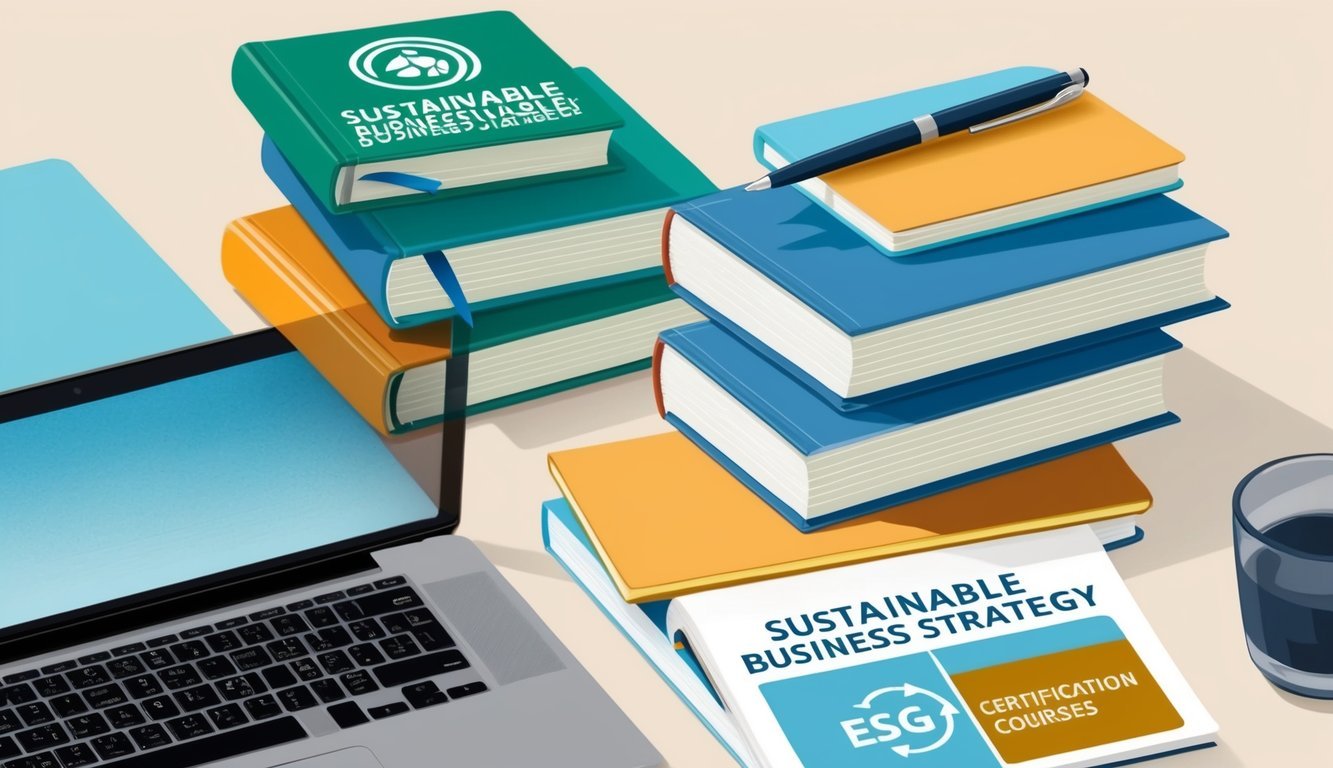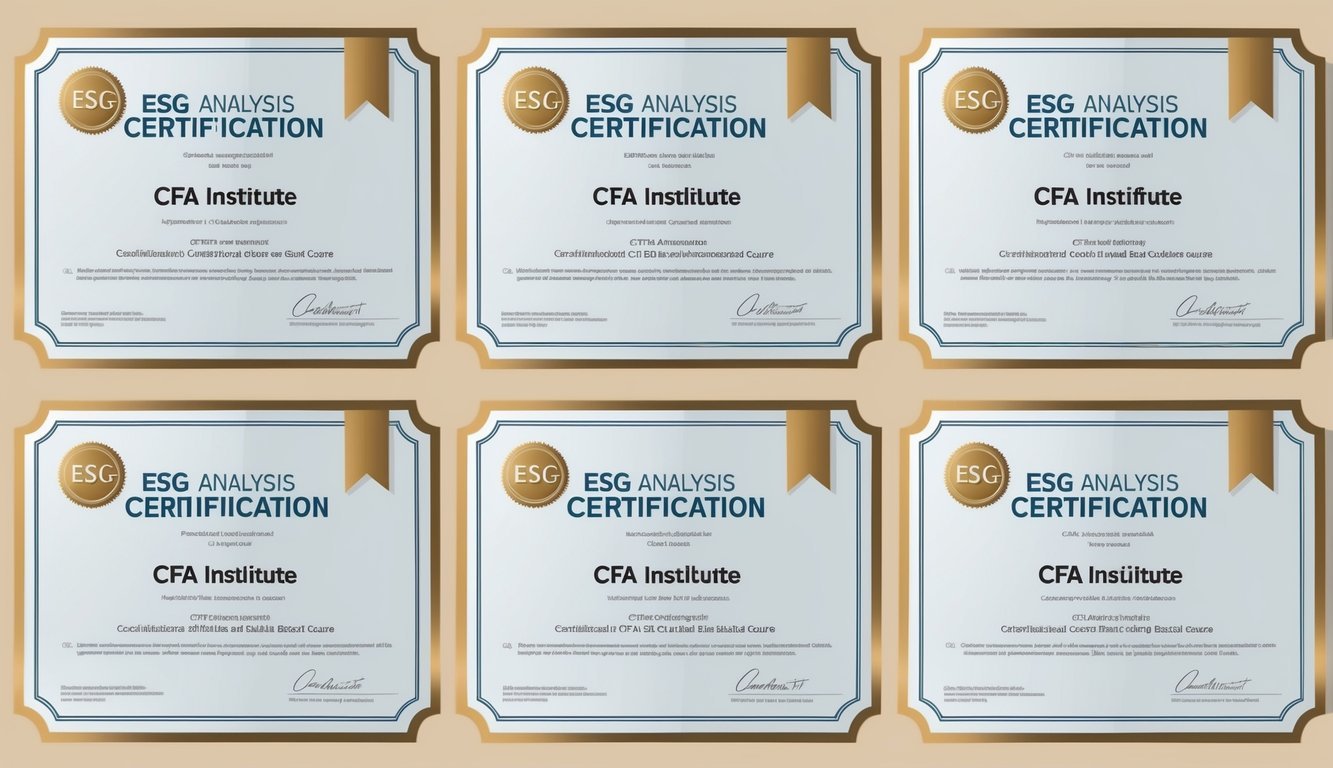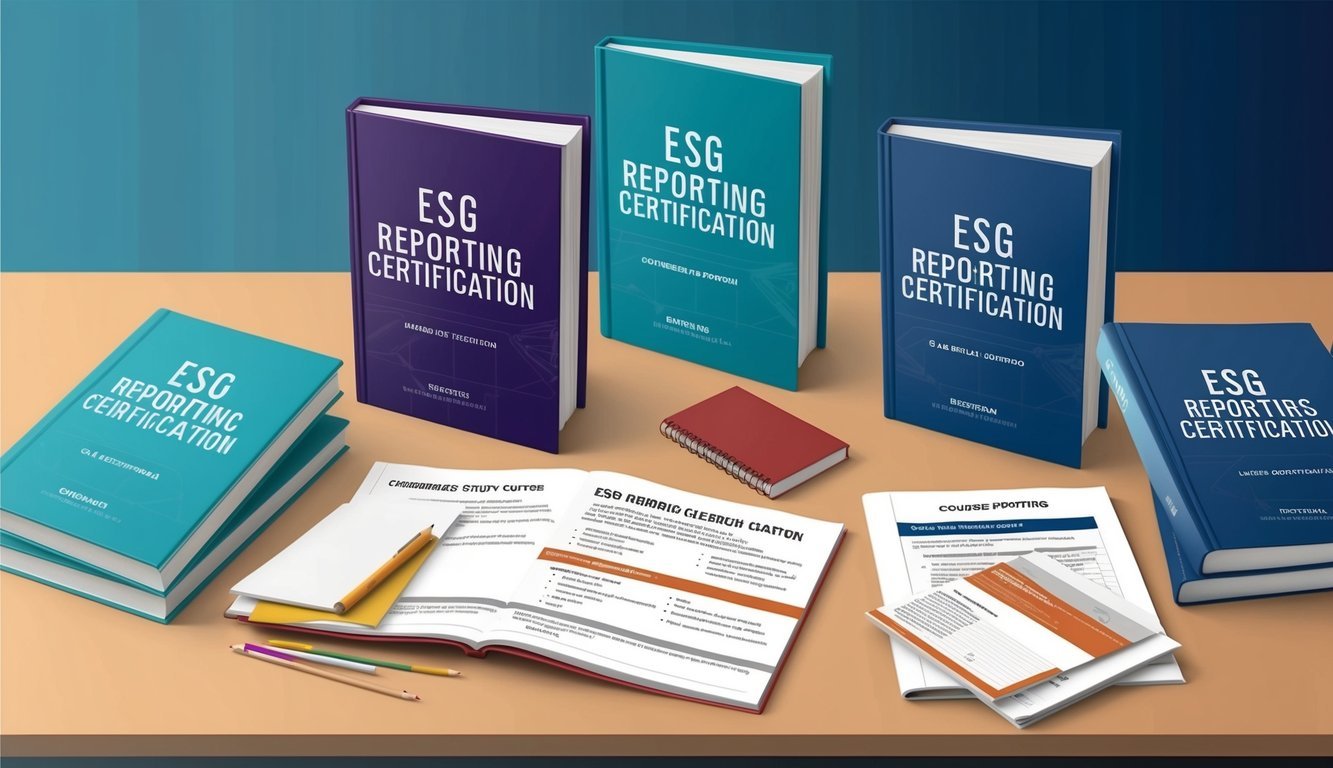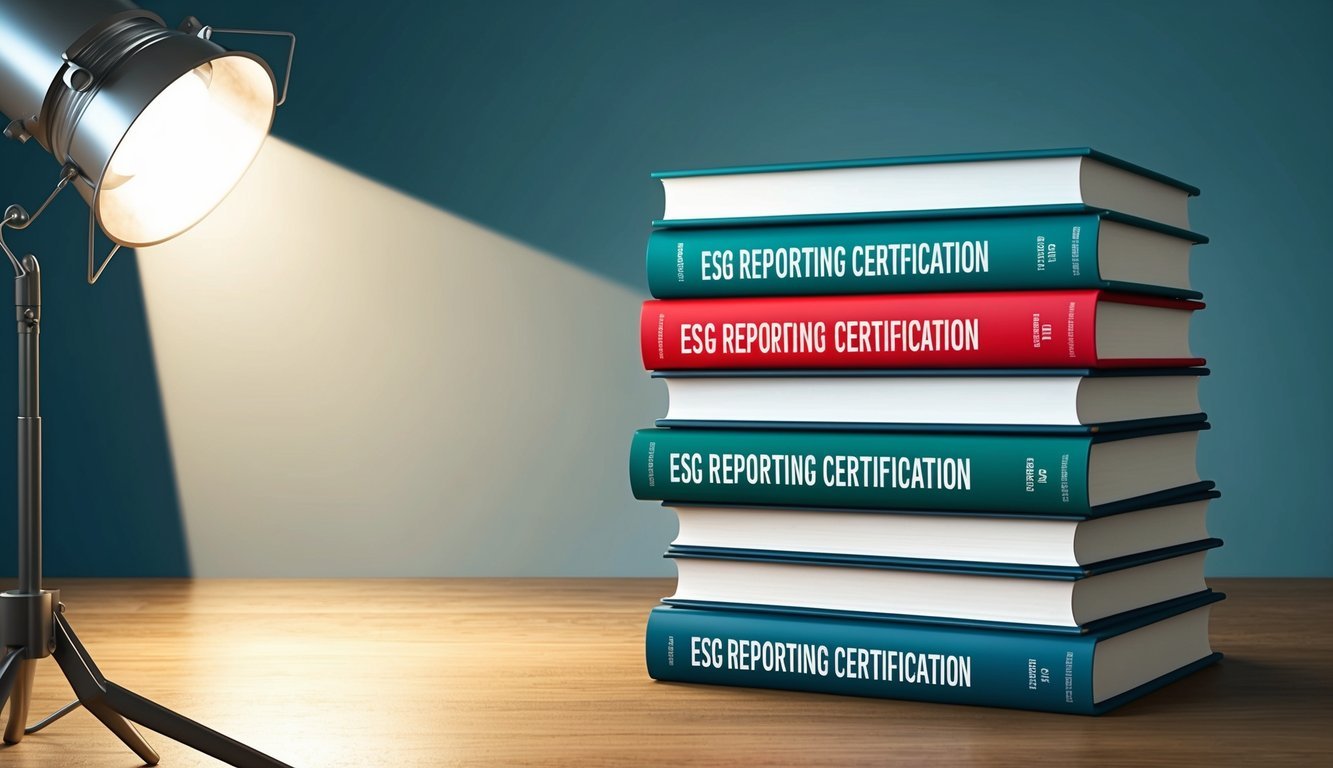ESG reporting is totally the talk of the town in the business world.
Companies are eager to prove they care about the environment, society, and how they’re governed.
But let’s face it, figuring out how to report on all this can be tricky!

That’s where ESG reporting certification courses come into play.
These courses can equip you with the skills to create stellar ESG reports for your company.
You’ll get the lowdown on the latest standards and best practices, plus gain hands-on experience with real-world examples.
Whether you’re just dipping your toes into ESG or looking to boost your skills, there’s a course that fits your needs.
1) Sustainable Business Strategy by Harvard Business School

Want to become a business leader with purpose? Check out the Sustainable Business Strategy course offered by Harvard Business School Online.
This 3-week program gives you the tools to make a real impact.
You’ll learn how businesses can tackle big global issues.
With around 15-20 hours needed to complete, it’s an ideal addition to your skillset if sustainability is your jam.
Plus, since the program is fully online, you can squeeze it into your packed schedule.
You’ll earn a certificate that looks great on your resume, and who doesn’t love that?
Throughout the course, you’ll explore how various companies are making a difference and get hands-on with projects that apply what you’ve learned to real-world scenarios.
It’s perfect for managers, entrepreneurs, or anyone who’s passionate about sustainable business practices.
You’ll be learning from some top-notch Harvard professors—all without leaving your couch.
How awesome is that?
2) ESG Moving from Theory to Practice by Wharton Online

If you’re ready to roll up your sleeves and get hands-on, the Wharton ESG Essentials program could be just what you need.
This course goes beyond the basics and arms you with practical applications.
Get ready to dive into the financial aspects of ESG.
You’ll discover how ESG factors can influence your company’s bottom line.
It’s not just theoretical fluff—you’ll learn pragmatic ways to weave ESG into your business strategies.
Guided by Wharton’s experts, you’ll learn about the evolution of ESG and where it’s going.
The course also tackles challenges like data issues and measuring ESG impact.
Want more? Take a look at the Wharton ESG Executive Certificate for Senior Leaders, which builds on this to give a multi-faceted view of ESG, including insights from investors and top executives.
These programs at Wharton are tailored for those looking to level up their ESG skills and apply new tools instantly in their careers.
3) ESG Analysis Certification by CFA Institute

Looking to up your ESG game? The CFA Institute’s ESG Investing certification might just be the perfect match.
This program gives you a solid foundation in ESG factors within the finance world.
Get ready to tackle ESG investing from a high-level perspective.
The course dives into sustainability contexts and global initiatives, helping you see how ESG fits into the finance jigsaw.
Known for its rigorous standards, the CFA Institute doesn’t cut corners here.
You’ll gain practical skills to integrate ESG factors into your investment choices.
This course is fantastic for finance pros eager to stay ahead of the curve and for anyone interested in sustainable investing.
You’ll walk away with knowledge you can use right away—an invaluable boost in today’s job market where ESG is increasingly vital.
4) Corporate Social Responsibility and Sustainable Business by U.S. Chamber of Commerce
Want to understand corporate social responsibility from a business viewpoint? This course from the U.S. Chamber of Commerce might be for you.
The Corporate Social Responsibility program covers how businesses can positively impact society.
You’ll learn about building relationships between businesses, communities, and government entities.
Through this course, you’ll see how companies can make a difference while still being profitable.
It discusses ways businesses can support workers and promote financial security.
You’ll also touch on environmental and sustainability challenges affecting companies today.
Expect discussions on how businesses can adapt while adhering to environmental policies.
Another key focus is ESG reporting.
You’ll get tips on crafting clear and impactful reports that effectively communicate a company’s environmental and social initiatives.
By taking this course, you’ll develop skills that help businesses thrive while also making a positive difference in their communities.
5) Leading with a Public Purpose by Oxford University’s Said Business School

Want to learn how to lead with purpose? Oxford’s Said Business School has a course just for you.
The Leading Sustainable Corporations Programme is designed for executives wanting to make a real impact.
This six-week online course requires about 7-10 hours of your time weekly—just enough to learn cool stuff without overwhelming your schedule.
Learn from top professors at Oxford, along with industry experts who are leading the charge in sustainability.
You’ll explore balancing profits with planetary kindness and figuring out how to measure your company’s impact.
By the end of the course, you’ll have a solid action plan to enhance your business’s sustainability efforts.
Plus, you’ll earn a prestigious certificate to show off!
Fun fact: Only about 6% of large companies have robust sustainability plans.
This course will help you join that exclusive club and truly make a difference.
6) ESG Essentials by London Business School

Want to get the inside scoop on ESG? The ESG Essentials course from London Business School is a fantastic way to catch up on environmental, social, and governance issues.
This online program is perfect for those with busy lives.
Learn at your own speed while tackling key ESG topics that matter in today’s business climate.
You’ll dig into sustainable investing strategies and learn how to assess ESG risks effectively.
Plus, you’ll find out how to measure the impact of ESG factors on companies.
London Business School is well-respected for its top-tier education, and the faculty brings a wealth of real-world experience to the table.
After finishing this course, you’ll have a strong grasp of ESG concepts—knowledge that will help you make better decisions in investments or your job.
It’s great to stay ahead in such a growing field!
Understanding ESG Reporting
ESG reporting is all about how a company navigates environmental, social, and governance challenges.
It’s a key way for businesses to highlight their sustainability efforts and the risks they face.
The Importance of ESG Reporting
These reports aren’t just nice-to-haves—they show stakeholders that companies are playing it straight.
They can enhance your brand image and pull in investors who care about sustainability.
Nowadays, many stakeholders expect ESG reports from businesses.
Plus, these reports can help you uncover risks and opportunities for improvement.
They tackle topics like carbon footprints, worker safety, and board diversity.
By keeping an eye on these aspects, you can strengthen your business in the long run.
Oh, and let’s not forget—good ESG practices can save you some cash.
They often highlight ways to cut energy use or reduce waste, leading to lower costs and a more efficient operation.
Key Components of ESG Reports
A solid ESG report usually touches on three main areas:
-
Environmental: This focuses on your impact on the planet, covering aspects like:
- Energy consumption
- Waste management
- Carbon emissions
-
Social: This highlights how you treat people, discussing:
- Employee rights
- Community engagement
- Product safety
-
Governance: This relates to how your business is managed, which includes:
- Diversity in leadership
- Ethics policies
- Executive compensation
Your report should include clear metrics to show your progress in these areas.
It’s also a good idea to set future goals and outline how you plan to achieve them.
Choosing the Right Certification

Picking the right ESG reporting certification can really push your career and skills to the next level.
Take your time considering your options and think about what you’ll gain from each.
Factors to Consider
When deciding on an ESG certification, check out the course content.
Does it cover what you need? The CFA ESG certification offers a comprehensive look at ESG investing.
Think about how much time you can spare—some courses are self-paced while others have more rigid schedules.
For example, the EcoSkills ESG Reporting course typically takes around 15-20 hours and allows you to work at your own pace.
Cost matters too—prices vary quite a bit.
Compare courses to find one that aligns with your budget.
Consider the reputation of the organization offering the course.
Are they well-regarded in the ESG field? This can influence how valuable your certification is seen by employers.
Benefits of Certification
Getting certified can open up a treasure chest of job opportunities—many companies are on the lookout for ESG experts these days.
You’ll learn hands-on skills too.
The GARP SCR certification, for example, zeroes in on risk management as it relates to climate change.
Networking is a big bonus—you’ll meet fellow professionals during your training, which could lead to new connections and job leads.
Plus, a certification shows you’re committed to ESG.
It proves you’ve dedicated time to learn the latest practices, helping you shine when applying for jobs or promotions.
Frequently Asked Questions

ESG certification and reporting can seem overwhelming.
Here are some common questions about courses, standards, and the journey to get certified in this expanding field.
How do I become a certified ESG consultant?
To become an ESG consultant, you’ll want to take courses from respected institutions.
The Sustainable Business Strategy program from Harvard is a great starting point.
Gain hands-on experience in sustainability roles and network with professionals in the field.
Don’t forget to keep your finger on the pulse of the latest ESG trends and regulations!
What are the top online courses for ESG certification?
Some standouts include Wharton Online’s ESG Moving from Theory to Practice and the CFA Institute’s ESG Analysis Certification.
These courses are packed with key ESG concepts and practical skills, taught by industry experts and offering flexible online learning.
Don’t forget to check out the best diversity and inclusion courses as they can enhance career opportunities while promoting a more inclusive and sustainable work environment.
What’s the deal with free ESG certification courses?
Free ESG courses can offer a nice introduction, but they might skimp on depth.
Paid courses usually provide more thorough content and recognizable certificates.
Check out platforms like Coursera for options that might have free trials or financial aid available; these can lead to a great learning experience without breaking the bank.
Can companies get certified in ESG, and how?
Absolutely, companies can earn ESG certifications! They just need to meet the specific standards laid out by certifying bodies, which include assessing their practices, reporting ESG metrics, and undergoing third-party audits.
It’s a detailed process that really shows a firm’s commitment to sustainability.
What’s the best certificate course for sustainability out there?
The “best” course really depends on your goals and background.
For a strong program, check out Oxford University’s Said Business School and their “Leading with a Public Purpose” course.
Harvard’s “Sustainable Business Strategy” program is also a top choice.
Always look for courses that align with your career aspirations and learning preferences.
Which ESG reporting standard is considered the best?
There’s no single “best” ESG reporting standard—it can really vary by industry and location.
Popular options include GRI, SASB, and TCFD.
Many companies find a mix of standards works best for them.
Just make sure to keep up with the evolving global ESG reporting rules to find what fits your needs best.

